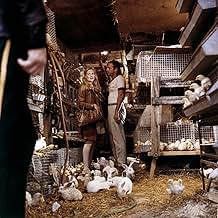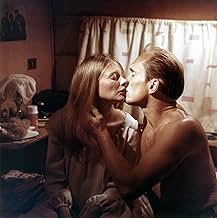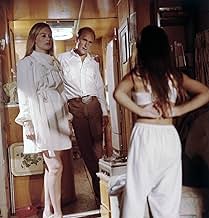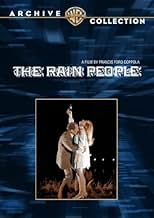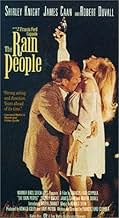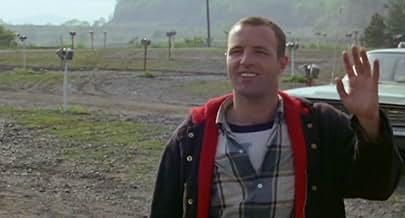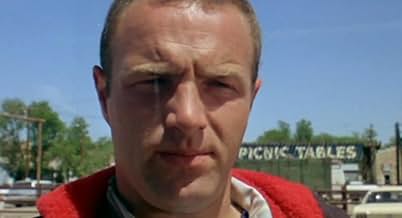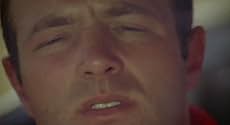PUNTUACIÓN EN IMDb
6,8/10
4,4 mil
TU PUNTUACIÓN
Una mujer embarazada se da a la fuga para obtener un poco de libertad y reevaluar sus elecciones vitales.Una mujer embarazada se da a la fuga para obtener un poco de libertad y reevaluar sus elecciones vitales.Una mujer embarazada se da a la fuga para obtener un poco de libertad y reevaluar sus elecciones vitales.
- Dirección
- Guión
- Reparto principal
- Premios
- 1 premio en total
Laura Crews
- Ellen
- (as Laurie Crews)
Garrett Cassell
- Farmer
- (sin acreditar)
Eleanor Coppola
- Gordon's Wife
- (sin acreditar)
Reseñas destacadas
Of all his films it would appear that Francis Ford Coppola is particularly fond of "The Rain People", a very modest and some might say 'arty' drama he made early in his career. Like a lot of American films popular at the time it's a 'road movie' with Shirley Knight as the young wife who ups and leaves her husband in the middle of the night, gets in her car and drives West for no paricular reason she can think of, meeting on her journey James Caan, (brain-damaged football player), and Robert Duvall, (randy motorcycle cop). She also happens to be pregnant and, like so many Americans in movies at the time, has gone off to 'find herself'.
Coppola says it was a personal project and there are some people who think it's his first masterpiece but it wasn't a hit and despite Coppola's name on the credits has become something of a lost movie. Knight is excellent as she mopes about and, you might say, teasing any man who comes her way while Duvall and especially Caan match her at every turn. You could say it's a quintessential American film of its time, a 'movie-brat' movie if there ever was one and Coppola's first real 'signature' picture, (though I do have a soft-spot for the wonderful "Finian's Rainbow" which preceeded it). If you do get a chance to track this down it is certainly well worth seeing.
Coppola says it was a personal project and there are some people who think it's his first masterpiece but it wasn't a hit and despite Coppola's name on the credits has become something of a lost movie. Knight is excellent as she mopes about and, you might say, teasing any man who comes her way while Duvall and especially Caan match her at every turn. You could say it's a quintessential American film of its time, a 'movie-brat' movie if there ever was one and Coppola's first real 'signature' picture, (though I do have a soft-spot for the wonderful "Finian's Rainbow" which preceeded it). If you do get a chance to track this down it is certainly well worth seeing.
In some scenes in the Rain People, Francis Ford Coppola's precursor to his hey-day of the seventies, there is the mark of a similar situation to 1969's Easy Rider, but not exactly in the same reference frame. Here we have a drama about disconnected people from society, in some ways alienated by the choices or by limits imposed by one mean or another. It's one of those rare original dramas where some scenes stand alone as total knockouts.
Even with such a low-string budget and a very freewheeling, so to speak, attitude about filming the movie, Coppola is able to capture everything that needs to be said through these clearly defined characters and the curved, unexpected degrees of one character versus the helplessness of another, or vice versa, or both. And, as one might be inclined seeing as how it is very much about the cutaways of suburban life of the 1960s, it has that escapism of the film mentioned before, but of a more concrete, near timeless quality with the drama and the underlying issues. In a way, if Bergman were on route as a quasi-guerrilla 20-something filmmaker out to get the strange truths of everyday outsiders, this might be it.
But along with all of the very direct and sometimes self-conscious photography (though also with a more documentary approach at times, akin with its indeterminable characters), the actors all fit into place. Shirley Knight, an actress I'm not too familiar with, has a complex, diverging role as a pregnant wife running off in a sort of existentialist conundrum of what life is there to have. There are moments of some awe-inspiring acting by her, and one of my favorites (if not my favorite) is when she is on the telephone calling her husband the first time. Such a tense scene on both ends, and in every small gesture and inflection of a word so much about her is spoken with so little.
It's extraordinary in ways that mirror others in Coppola's films. Then comes in the character of 'killer' played by James Caan. This, too, is a dangerous character to take on, as it is a mix of childish bewilderment and amusement with scarred memories. Think Forrest Gump if he didn't make it past the football and wit. It's one of his best, actually, by being the most minimalist- for a guy who's usually playing tough guys in movies, here's one that also is part of the crux of the story and of Knight's character. Also very good in a supporting role is Robert Duvall as a cop with a rough side and rather checkered past; kind of an early sample of other defected characters he would play later on in his career.
So the characters, and what Coppola risks in having an uneasiness running in them, are really what make up the film, as whatever story there is it is definitely not resolved in the usual way you might think or expect. The last ten or so minutes are like others in Coppola's work, where the specific tragedies on all sides are undercut by the emotional- and psychological- implications this will leave on the principles are amplified to the sublime and sad.
This is, for its time, brave on the part of what is trying to be represented (in both the freedom as well as the flaws and ambiguities) in the subject matter. And the style of the picture adds a fragmented kind of view onto it all with quick flashbacks that are graphic and self-contained in a contrast with the longer shots in some crucial scenes. It's a road movie of its period, but its also got a lot more working than it would under another filmmaker with less chances to take on the nature of these outcast characters. One of the best films of 1969.
Even with such a low-string budget and a very freewheeling, so to speak, attitude about filming the movie, Coppola is able to capture everything that needs to be said through these clearly defined characters and the curved, unexpected degrees of one character versus the helplessness of another, or vice versa, or both. And, as one might be inclined seeing as how it is very much about the cutaways of suburban life of the 1960s, it has that escapism of the film mentioned before, but of a more concrete, near timeless quality with the drama and the underlying issues. In a way, if Bergman were on route as a quasi-guerrilla 20-something filmmaker out to get the strange truths of everyday outsiders, this might be it.
But along with all of the very direct and sometimes self-conscious photography (though also with a more documentary approach at times, akin with its indeterminable characters), the actors all fit into place. Shirley Knight, an actress I'm not too familiar with, has a complex, diverging role as a pregnant wife running off in a sort of existentialist conundrum of what life is there to have. There are moments of some awe-inspiring acting by her, and one of my favorites (if not my favorite) is when she is on the telephone calling her husband the first time. Such a tense scene on both ends, and in every small gesture and inflection of a word so much about her is spoken with so little.
It's extraordinary in ways that mirror others in Coppola's films. Then comes in the character of 'killer' played by James Caan. This, too, is a dangerous character to take on, as it is a mix of childish bewilderment and amusement with scarred memories. Think Forrest Gump if he didn't make it past the football and wit. It's one of his best, actually, by being the most minimalist- for a guy who's usually playing tough guys in movies, here's one that also is part of the crux of the story and of Knight's character. Also very good in a supporting role is Robert Duvall as a cop with a rough side and rather checkered past; kind of an early sample of other defected characters he would play later on in his career.
So the characters, and what Coppola risks in having an uneasiness running in them, are really what make up the film, as whatever story there is it is definitely not resolved in the usual way you might think or expect. The last ten or so minutes are like others in Coppola's work, where the specific tragedies on all sides are undercut by the emotional- and psychological- implications this will leave on the principles are amplified to the sublime and sad.
This is, for its time, brave on the part of what is trying to be represented (in both the freedom as well as the flaws and ambiguities) in the subject matter. And the style of the picture adds a fragmented kind of view onto it all with quick flashbacks that are graphic and self-contained in a contrast with the longer shots in some crucial scenes. It's a road movie of its period, but its also got a lot more working than it would under another filmmaker with less chances to take on the nature of these outcast characters. One of the best films of 1969.
A 30-ish wife on Long Island (Shirley Knight) needs to just get away and so enters her station wagon and drives west. To where? She doesn't know, but she picks up an ex-college football player (James Caan) before meeting a motorcycle cop (Robert Duvall).
"The Rain People" (1969) was made three years before Francis Ford Coppola became famous with "The Godfather." It was his first movie in which he had total creative control, writing and directing on the road without producers breathing down his neck. The story was inspired by Francis' mother curiously leaving home for a few days when he was a kid. It's about a woman's haphazard search for freedom from the manacles of domestic life. Unlike the domineering male protagonists of "Patton" (which he wrote), the Corleone patriarchs and Kurtz in "Apocalypse Now," Coppola shows us here several females manipulating men: Natalie with Kilgannon, Gordon and even Vinny; Ellen with Kilgannon and her father; and Rosalie with her dad.
Interestingly, it's the express opposite of Francis' previous movie, the fun "Finian's Rainbow," which was based on the 1947 Broadway hit. One is an energetic musical with a large cast while this has an everyday, depressing tone, made with a small cast & crew. While neither were successful at the box office, they both went on to garner cult followings after Coppola's great success in the 1970s-90s (of course he had a few movies that didn't do so well, but what else is new?).
I can see where many viewers would find "The Rain People" dull, but it features a daring premise and has historical significance, not to mention some notable cast members. Plus, it's a quality period piece for the late '60s. In regards to the commendable premise, Natalie loves her husband, but is uncertain about the responsibility of having his child and so instinctively flees the scene. Ironically, Killgannon becomes her surrogate 'child' on her road odyssey wherein she struggles with her obligations.
Concerning the 'historical significance,' the industry proudly cites "Stand Up and Be Counted" as the first flick to address women's liberation, which it overtly does. But this came out three years prior and few people noticed at the time because it's so covert. It was ahead of its time.
Francis originally intended to include a scene at the end to clear up what Natalie decides to do from there, but it wasn't needed because everything is explained in her monologue. Listen.
It runs 1 hour, 41 minutes, and was shot over the course of five months in several American states with a 10-person crew (along with a smattering of locals). The locations include: Garden City (opening shot), Manhattan (Lincoln Tunnel) & Hofstra University, New York; the Pennsylvania Interstate; Harrisonburg, Virginia (restaurant scene); Clarksburg (the drive-in theater) & Weston, West Virginia; Chattanooga, Tennessee (the parade); Brule (the burning house) & Ogallala (the reptile ranch), Nebraska; and other places for exterior shots.
GRADE: B/B-
"The Rain People" (1969) was made three years before Francis Ford Coppola became famous with "The Godfather." It was his first movie in which he had total creative control, writing and directing on the road without producers breathing down his neck. The story was inspired by Francis' mother curiously leaving home for a few days when he was a kid. It's about a woman's haphazard search for freedom from the manacles of domestic life. Unlike the domineering male protagonists of "Patton" (which he wrote), the Corleone patriarchs and Kurtz in "Apocalypse Now," Coppola shows us here several females manipulating men: Natalie with Kilgannon, Gordon and even Vinny; Ellen with Kilgannon and her father; and Rosalie with her dad.
Interestingly, it's the express opposite of Francis' previous movie, the fun "Finian's Rainbow," which was based on the 1947 Broadway hit. One is an energetic musical with a large cast while this has an everyday, depressing tone, made with a small cast & crew. While neither were successful at the box office, they both went on to garner cult followings after Coppola's great success in the 1970s-90s (of course he had a few movies that didn't do so well, but what else is new?).
I can see where many viewers would find "The Rain People" dull, but it features a daring premise and has historical significance, not to mention some notable cast members. Plus, it's a quality period piece for the late '60s. In regards to the commendable premise, Natalie loves her husband, but is uncertain about the responsibility of having his child and so instinctively flees the scene. Ironically, Killgannon becomes her surrogate 'child' on her road odyssey wherein she struggles with her obligations.
Concerning the 'historical significance,' the industry proudly cites "Stand Up and Be Counted" as the first flick to address women's liberation, which it overtly does. But this came out three years prior and few people noticed at the time because it's so covert. It was ahead of its time.
Francis originally intended to include a scene at the end to clear up what Natalie decides to do from there, but it wasn't needed because everything is explained in her monologue. Listen.
It runs 1 hour, 41 minutes, and was shot over the course of five months in several American states with a 10-person crew (along with a smattering of locals). The locations include: Garden City (opening shot), Manhattan (Lincoln Tunnel) & Hofstra University, New York; the Pennsylvania Interstate; Harrisonburg, Virginia (restaurant scene); Clarksburg (the drive-in theater) & Weston, West Virginia; Chattanooga, Tennessee (the parade); Brule (the burning house) & Ogallala (the reptile ranch), Nebraska; and other places for exterior shots.
GRADE: B/B-
Five years earlier and I doubt the movie could have found a distributor. It's slow, contemplative, and nothing much happens until the end. But for those who follow inner conflict as well as outer, it's a stunner. Pregnant suburban wife Knight hits the road, fleeing a consuming marriage. But she's not just fleeing, she's also aimlessly searching—note how she first bypasses Caan before hazily backing up. Trouble is Caan's brain damaged, and in need of adult supervision. Now Knight's in a pickle. On one hand, her budding maternal instinct kicks in; on the other, a grown child is too much what she's fleeing from. Thus, the confusion of her life mounts. But hey, she meets macho cop Duvall who's got adventure written all over him. Yet he turns out to be domineering and mean, probably too much like the husband she's abandoned. This leads up to an ending that is both touching and ironic.
For expansive post-war couples the suburbs were liberating; but a generation later and younger folks like Knight felt confined. This is a 60's road picture feminine style. When Americans get restless or unhappy, they head westward in frontier tradition. So why shouldn't a woman, even when alone and vulnerable. The acting here is outstanding, and it better be since character carries the story or what there is of it. I really like Caan who shows why less is sometimes more. And get a load of those desolate roadsides, no cosmetic Hollywood here. Too bad the film's so obscure in the Coppola canon. All in all, it's a telling reflection of a restless time, perhaps even of what some call the human condition. However, I can understand why it's not everyone's cup of tea, and certainly a long way from Coppola's next, The Godfather (1972).
For expansive post-war couples the suburbs were liberating; but a generation later and younger folks like Knight felt confined. This is a 60's road picture feminine style. When Americans get restless or unhappy, they head westward in frontier tradition. So why shouldn't a woman, even when alone and vulnerable. The acting here is outstanding, and it better be since character carries the story or what there is of it. I really like Caan who shows why less is sometimes more. And get a load of those desolate roadsides, no cosmetic Hollywood here. Too bad the film's so obscure in the Coppola canon. All in all, it's a telling reflection of a restless time, perhaps even of what some call the human condition. However, I can understand why it's not everyone's cup of tea, and certainly a long way from Coppola's next, The Godfather (1972).
I have a letter from Ms. Knight, who went to college with my older sister. In it, she tells of the hardships of making this film. She, herself, was pregnant--an interesting conjunction with the movie's plot--and the novice director was unsure, fairly green, and having great difficulties with all the decisions, logistics, etc. They were on the move all the time, and it was a very difficult shoot.
The film, however, with a strong debut for James Caan, remains effective and affecting. It's a great showcase for the talent that Ms. Knight has demonstrated her entire career--on television, in movies and on the stage, where she won the Tony for "Kennedy's Children."
This film has aged well.
The film, however, with a strong debut for James Caan, remains effective and affecting. It's a great showcase for the talent that Ms. Knight has demonstrated her entire career--on television, in movies and on the stage, where she won the Tony for "Kennedy's Children."
This film has aged well.
¿Sabías que...?
- CuriosidadesThe parade scene was filmed in Chattanooga, Tennessee on Memorial Day. The students in the band were not aware of what was happening. In fact, reading the lips of a majorette, she can be seen asking, "Who was that guy?" as James Caan was weaving through the parade.
- PifiasWhen Natalie first leaves her husband, she drives into a tunnel and emerges from on the west side of Manhattan. That is, she has driven east through the Lincoln Tunnel, presumably heading east. But immediately after, she stops at a phone booth to call her husband, saying she is in Pennsylvania, which is in the opposite direction. Had the intention to suggest a westward journey, she could have driven west through the tunnel to emerge in New Jersey.
- Citas
Natalie Ravenna: You are the most obedient man I've ever met in my life. Look at me. Aren't you?
Jimmy Kilgannon: Yes.
Natalie Ravenna: Aren't you?
Jimmy Kilgannon: Yes.
Natalie Ravenna: Aren't you?
Jimmy Kilgannon: Yes.
Natalie Ravenna: Aren't you?
Jimmy Kilgannon: Yes.
Natalie Ravenna: Alright.
- ConexionesEdited into Filmmaker (1968)
Selecciones populares
Inicia sesión para calificar y añadir a tu lista para recibir recomendaciones personalizadas
- How long is The Rain People?Con tecnología de Alexa
Detalles
- Fecha de lanzamiento
- País de origen
- Idioma
- Títulos en diferentes países
- Gent de pluja
- Localizaciones del rodaje
- Chattanooga, Tennessee, Estados Unidos(Veterans Day parade)
- Empresas productoras
- Ver más compañías en los créditos en IMDbPro
Taquilla
- Presupuesto
- 750.000 US$ (estimación)
Contribuir a esta página
Sugerir un cambio o añadir el contenido que falta

Principal laguna de datos
By what name was Llueve sobre mi corazón (1969) officially released in India in English?
Responde

